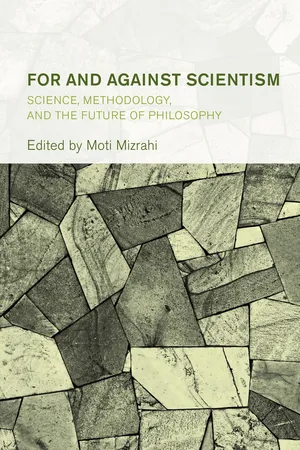
- 207 pages
- English
- PDF
- Available on iOS & Android
eBook - PDF
About this book
The term "scientism" is used in several ways. It is used to denote an epistemological thesis according to which science is the source of our knowledge about the world and ourselves. Relatedly, it is used to denote a methodological thesis according to which the methods of science are superior to the methods of non-scientific fields or areas of inquiry. It is also used to put forward a metaphysical thesis that what exists is what science says exists. In recent decades, the term "scientism" has acquired a derogatory meaning when it is used in defense of non-scientific ways of knowing. In particular, some philosophers level the charge of "scientism" against those (mostly scientists) who are dismissive of philosophy. Other philosophers, however, embrace scientism, or some variant thereof, and object to the pejorative use of the term. This book critically examines arguments for and against different varieties of scientism in order to answer the central question: Does scientism pose an existential threat to academic philosophy? Or should philosophy become more scientific?
Frequently asked questions
Yes, you can cancel anytime from the Subscription tab in your account settings on the Perlego website. Your subscription will stay active until the end of your current billing period. Learn how to cancel your subscription.
No, books cannot be downloaded as external files, such as PDFs, for use outside of Perlego. However, you can download books within the Perlego app for offline reading on mobile or tablet. Learn more here.
Perlego offers two plans: Essential and Complete
- Essential is ideal for learners and professionals who enjoy exploring a wide range of subjects. Access the Essential Library with 800,000+ trusted titles and best-sellers across business, personal growth, and the humanities. Includes unlimited reading time and Standard Read Aloud voice.
- Complete: Perfect for advanced learners and researchers needing full, unrestricted access. Unlock 1.4M+ books across hundreds of subjects, including academic and specialized titles. The Complete Plan also includes advanced features like Premium Read Aloud and Research Assistant.
We are an online textbook subscription service, where you can get access to an entire online library for less than the price of a single book per month. With over 1 million books across 1000+ topics, we’ve got you covered! Learn more here.
Look out for the read-aloud symbol on your next book to see if you can listen to it. The read-aloud tool reads text aloud for you, highlighting the text as it is being read. You can pause it, speed it up and slow it down. Learn more here.
Yes! You can use the Perlego app on both iOS or Android devices to read anytime, anywhere — even offline. Perfect for commutes or when you’re on the go.
Please note we cannot support devices running on iOS 13 and Android 7 or earlier. Learn more about using the app.
Please note we cannot support devices running on iOS 13 and Android 7 or earlier. Learn more about using the app.
Yes, you can access For and Against Scientism by Moti Mizrahi in PDF and/or ePUB format, as well as other popular books in Philosophy & Epistemology in Philosophy. We have over one million books available in our catalogue for you to explore.
Information
Table of contents
- Cover
- Half Title
- Series Page
- Title Page
- Copyright Page
- Contents
- Introduction
- The Scientism Debate: A Battle for the Soul of Philosophy?
- The Supposed Specter of Scientism
- Conceptions of Philosophy and the Challenges of Scientism
- How to Defend Scientism
- Philosophy of Science in Practice and Weak Scientism Together Apart
- “Science in the Crosshairs”
- Between Electrical Light Switches and Panpsychism: Scientism and the Responsibilities of the Humanities in the Twenty-First Century
- Whither Academic Philosophy?
- Epilogue
- Index
- About the Editor
- About the Contributors